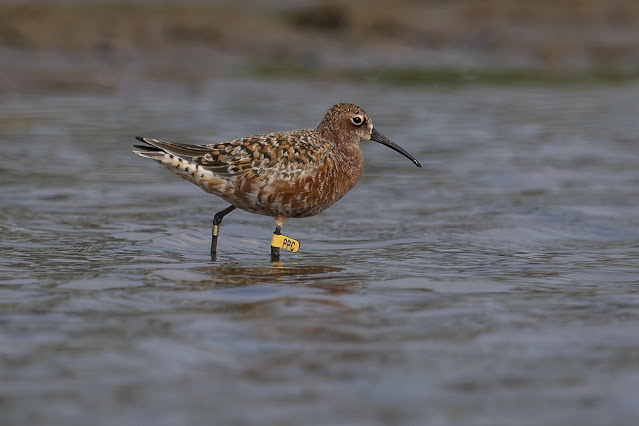Seeing migrants is certainly a highlight during spring, although this is also a really good time to look for some of our rarer breeding species. Chinese Grassbird is a scarce species in Hong Kong, you can only find them in grassland and short bamboo thickets up near the summit of taller mountains. Tai Mo Shan is perhaps one of the stronghold for this species, although finding them still require a bit of luck. I find April to be one of the best month of the year to locate them, as this is when they are most vocal. A client specifically wanted to look for our montane species, and Chinese Grassbird is of course one of our main target. We got lucky and found this pair up on Tai Mo Shan, of which I believe to be a breeding pair. They showed incredibly well despite it being a very misty morning, we got great views! We didn't see that much up there that day, partly due to the mist, but a Brown-flanked Bush Warbler also showed well.
 |
| Chinese Grassbird - a pair together |
 |
| Brown-flanked Bush Warbler |
We tried Shek Kong Catchment at the lower elevation and connected with both a male Hainan Blue Flycatcher in song, as well as a sub-adult male Narcissus Flycatcher. Hainan Blue Flycatchers seems to be slightly behind schedule this year, but they are finally arriving and we are now hearing them in many of our forested areas. The most interesting observation at Shek Kong Catchment was however not a bird, but a Yellow Coster, a rare butterfly species in Hong Kong.
 |
| Hainan Blue Flycatcher - male |
 |
| Narcissus Flycatcher - sub-adult male |
 |
| Yellow Coster - Acraea issoria |
I tried Kap Lung one day and yielded three Hodgson's Hawk Cuckoos and a male Blue-and-White Flycatcher, although none of those stayed long enough for a photo. Most of the birds that are still there were busy either building nests or pairing up, here a Blue-winged Minla gathering nesting materials and one of a pair of Mountain Bulbul along the trail.
 |
| Blue-winged Minla |
 |
| Mountain Bulbul |
Over at Mai Po, other than the numerous Little and Black-faced Buntings along the footpath, a female Brambling was spotted feeding on the Casuarina, this species is a regular spring migrant in Hong Kong, while I most often see them on Po Toi, this was actually the first time seeing one in Mai Po.
 |
| Brambling - female |
A few Little Terns have been frequenting the scrape during high tide, occasionally feeding relatively close to the bird hide. Many Gull-billed Terns also came into the scrape to roost.
 |
| Little Tern |
 |
| Gull-billed Tern |
Other than the regular waders, up to 9 Nordmann's Greenshanks been seen on the scrape this week, quite a good count for this Endangered species. While seeing them on the scrape is relatively easy, having them close enough for photo is not, unfortunately all of them roosted quite far away from the bird hide, I only managed a few record photos.
 |
| Common (left) & Nordmann's Greenshank (right) |
 |
| Nordmann's Greenshank |
The drained pond at San Tin continues to produce a good number of waders, being able to get lower down also enable me to get some more decent photos of these migrants. Here, a tagged Curlew Sandpiper amongst the flock, apparently tagged in Australia!
 |
| Curlew Sandpiper |
There were plenty of Red-necked Stints there, a common species I've always had a soft spot for. The Little Stint I recently found was nowhere to be found.
 |
| Red-necked Stint |
Long-toed Stints are now in very good numbers, this is one of the most colourful of the stints and surely one of the prettiest. The three Sharp-tailed Sandpipers were still present.
 |
| Long-toed Stint |
 |
| Sharp-tailed Sandpiper |
Other than waders, numerous Eastern Yellow Wagtails were feeding on the same pond, many of them in full breeding plumage looking very bright!
 |
| Eastern Yellow Wagtail |
I've been far too busy to check Tai Mei Tuk Catchment, but I am very glad to went there for a quick walk one morning. A single female Yellow-billed Grosbeak was seen, which is my first sighting of this species here. A rather confiding Velvet-fronted Nuthatch showed well, a species I seldom see here. The best bird of the morning was no doubt an adult male Narcissus Flycatcher, which showed really well.
 |
| Yellow-billed Grosbeak - female |
 |
| Velvet-fronted Nuthatch |
 |
| Narcissus Flycatcher - male |
Finally, as it gets warmer, more insects are now emerging and becoming active, a South China Moon Moth was one of the more spectacular looking species you can come across at this time of the year.
 |
| South China Moon Moth - Actias sinensis |





































No comments:
Post a Comment